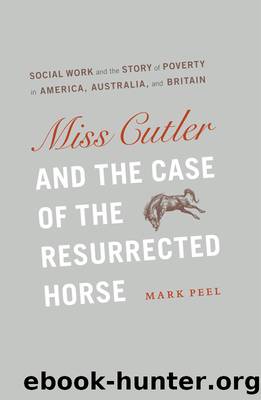Miss Cutler and the Case of the Resurrected Horse by Mark Peel

Author:Mark Peel [Peel, Mark]
Language: eng
Format: epub
Tags: History, General, United States, 20th Century, Social Science, Sociology, Urban
ISBN: 9780226653662
Google: d-TyBJF4tTIC
Publisher: University of Chicago Press
Published: 2011-11-15T15:58:24+00:00
CHAPTER 18
The Primitive Becoming More and More Dominant
âAwfully abusive.â âA little bit of a thing and a very smooth talker.â A file transferred from a female to a male worker âin case of trouble.â A confrontation, a health inspector, the bringing of a policeman, and forced admission. Runaway children, a son dead in an industrial accident, a daughter pregnant with no husband. The mother in court for assault and battery on a neighborâs child. âGeneral complaining,â âit is obvious he is mental,â âshe is somewhat like father in profuse flow of language,â the familyâs âwordy battle.â And this neatly typed letter from the father: âMy home heretofore has not been a gallery of observation and curios. . . . I was born in America, and have all the respectful feelings of an American. Each American is so trained that they are home only in their own homes. There are conditions in every home of the Americans that are not always put on exhibition to the general public.â This request for dignity seems to have done little good. As agent Derrick Henderson wrote in the file after one episode, âQuite a scene ensued, the primitive negro becoming more and more dominant.â61
In Boston, race was the overpowering barrier, and African Americans were never part of a drama about transformation. They were more like the London poor, though the stories about them were less forgiving and more savage. Here, case files provide a particular window into the forms of difference that are seen as mutable and immutable in different places and times. In Melbourne and London, where class divided and organized the world, it was difficult for charity investigators to imagine doing anything more than detective work or small-scale charity with the inferior orders. In Boston, while some immigrants and poorer white Americans could be imagined as having âgood potential,â African Americans were almost entirely irredeemable; the most significant division there was based squarely on race. Cases involving African American clients were relatively rare in Bostonâthere were certainly six and possibly several moreâbut very consistent in tone. In Minneapolis, the Family Welfare Association employed a specialized âcolored visitorâ from 1922 on. As far as I can tell, no such provision was made by the MSPCC or the CAA before 1950. During the 1920s and 1930s, the MSPCCâs annual report, a model of clarity, transparency, and careful discussion of social work and child protection trends, also contained crude jokes about the âanticsâ of âour colored friends.â Of course, what seems jarring now in the twenty-first century is often one of our best ways of understanding just what used to be taken for granted and said in public.
It mattered little if African American clients were educated or employed or locally born. All of the traits and decisions that drew forth positive responses when they were made by immigrants did nothing to change the often careless aggressiveness that characterized the treatment of African American families before the middle of the 1930s. Rosa Jackson of Medford approached
Download
This site does not store any files on its server. We only index and link to content provided by other sites. Please contact the content providers to delete copyright contents if any and email us, we'll remove relevant links or contents immediately.
Cecilia; Or, Memoirs of an Heiress — Volume 1 by Fanny Burney(32527)
Cecilia; Or, Memoirs of an Heiress — Volume 2 by Fanny Burney(31928)
Cecilia; Or, Memoirs of an Heiress — Volume 3 by Fanny Burney(31915)
The Great Music City by Andrea Baker(31898)
We're Going to Need More Wine by Gabrielle Union(19020)
All the Missing Girls by Megan Miranda(15888)
Pimp by Iceberg Slim(14464)
Bombshells: Glamour Girls of a Lifetime by Sullivan Steve(14037)
For the Love of Europe by Rick Steves(13810)
Talking to Strangers by Malcolm Gladwell(13330)
Norse Mythology by Gaiman Neil(13314)
Fifty Shades Freed by E L James(13215)
Mindhunter: Inside the FBI's Elite Serial Crime Unit by John E. Douglas & Mark Olshaker(9289)
Crazy Rich Asians by Kevin Kwan(9261)
The Lost Art of Listening by Michael P. Nichols(7475)
Enlightenment Now: The Case for Reason, Science, Humanism, and Progress by Steven Pinker(7287)
The Four Agreements by Don Miguel Ruiz(6728)
Bad Blood by John Carreyrou(6599)
Weapons of Math Destruction by Cathy O'Neil(6248)
